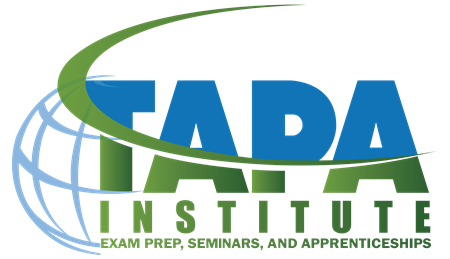Unlocking REG CPA Exam Success in 2024: How TAPA Institute Makes a Difference
Introduction
The Regulation (REG) section of the CPA exam is a critical part of the certification process, testing candidates on ethics, professional responsibilities, business law, and federal taxation. Given the complexity and breadth of this exam section, a well-structured study approach is essential. At TAPA Institute, we specialize in providing the resources and support needed to succeed in this challenging part of the CPA exam, ensuring candidates are well-prepared and confident.
Understanding the REG CPA Exam
The REG section of the CPA exam is designed to evaluate candidates in several key areas:
Ethics and Professional Responsibilities: This area focuses on the ethical obligations of CPAs, including understanding the code of conduct and the impact of ethical decision-making in accounting practices.
Business Law: Candidates must demonstrate knowledge of the legal principles governing business transactions, including contracts, sales, and secured transactions. Understanding these legal frameworks is crucial for CPAs who advise businesses on compliance and legal matters.
Federal Taxation: This topic covers taxation for individuals, entities such as corporations and partnerships, and property transactions. It also includes tax planning and compliance, requiring candidates to be proficient in applying tax laws to various scenarios.
Exam Format:
Multiple-Choice Questions (MCQs): 76 questions that test theoretical understanding and practical application of concepts.
Task-Based Simulations (TBSs): 8 simulations that assess the ability to apply tax knowledge to real-world scenarios, requiring critical thinking and problem-solving skills.
The Challenges of the REG CPA Exam
The REG section is known for its challenging nature due to several factors:
Complex Tax Laws: The REG exam demands a deep understanding of intricate and often changing tax laws. Staying updated with the latest regulations is essential for success.
Extensive Coverage: The exam encompasses a wide range of topics, from ethics to different types of taxation, which requires comprehensive study and preparation.
Application of Knowledge: Candidates must not only understand theoretical concepts but also demonstrate the ability to apply this knowledge to practical, real-world problems. This requires analytical thinking and the ability to connect theoretical knowledge with practical scenarios.
How TAPA Institute Prepares You for Success
At TAPA Institute, we have developed a strategic approach to mastering the REG CPA exam, focusing on key areas that drive success:
1. Expert-Led Instruction
Our instructors are experienced professionals with extensive backgrounds in taxation and business law. They provide invaluable insights and real-world examples, ensuring that students gain a comprehensive understanding of the material.
Real-World Insights: Our instructors incorporate current tax law updates and industry-relevant examples into their teaching, enhancing your learning experience and understanding of complex topics.
Interactive Learning: Through engaging lectures and discussions, students can clarify doubts and explore concepts in depth, making the learning process more dynamic and effective.
2. Tailored Study Plans
We recognize that each student has unique learning needs, which is why we offer personalized study plans designed to address individual strengths and weaknesses. This targeted approach ensures focused preparation and maximizes your potential for success.
Diagnostic Assessments: Initial assessments identify your specific areas of need, allowing us to tailor a study plan that focuses on those topics, ensuring efficient and effective learning.
Focused Learning: Customized plans ensure that you spend time on the areas that require the most attention while reinforcing your existing strengths, helping you build a strong foundation for the exam.
3. Comprehensive Study Materials
Our study materials are meticulously curated to cover every aspect of the REG exam:
Detailed Textbooks: Our textbooks provide a solid foundation for understanding key concepts, covering every topic in depth to ensure a thorough understanding of the material.
Practice Exams: Simulated exams replicate the actual CPA exam format, helping you become familiar with question types and time management, which are crucial for exam success.
Resource Library: Our extensive library includes various learning resources to support different study styles, including video lectures, flashcards, and interactive quizzes, ensuring you have access to all the tools you need to succeed.
4. Engaging Learning Techniques
We employ innovative learning techniques to make studying both effective and enjoyable:
Case Studies: Real-world scenarios help you apply theoretical knowledge to practical problems, enhancing critical thinking skills and making learning more engaging.
Group Discussions: Collaborative sessions foster peer learning, allowing students to learn from each other’s perspectives and experiences, further enhancing the learning experience.
5. Continuous Support and Guidance
At TAPA Institute, we are committed to supporting our students beyond the classroom. Our continuous guidance ensures that you remain motivated and on track throughout your preparation journey.
Mentorship Programs: Experienced mentors provide personalized guidance, helping you navigate challenges and build confidence, ensuring you stay motivated and focused on your goals.
One-on-One Tutoring: Individualized tutoring sessions offer tailored assistance for specific learning needs, ensuring that you receive the support you need to succeed in the REG exam.
Conclusion
Preparing for the REG CPA exam requires dedication, guidance, and the right resources. At TAPA Institute, we are committed to equipping our students with the skills and knowledge needed to succeed. Our expert-led instruction, tailored study plans, and comprehensive support make all the difference in your journey to becoming a CPA.

